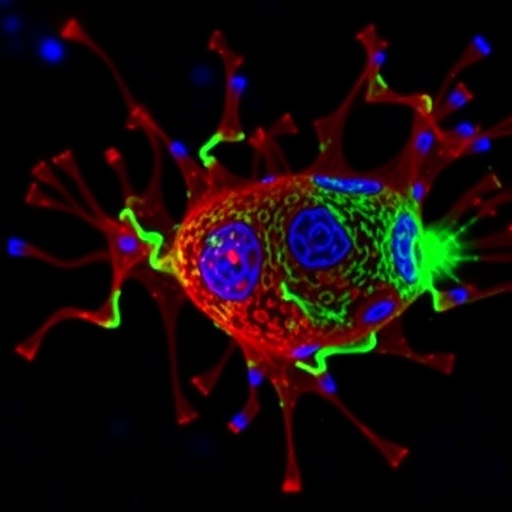In recent groundbreaking research, scientists led by Heiss, C.N., Riise, R., and Hanse, E., published an essential study that sheds light on the potential therapeutic strategies for Alzheimer’s disease. Their work explores the innovative concept of utilizing chimeric antigen receptors (CARs) engineered on microglia to enhance the phagocytosis of amyloid-beta peptides, specifically Aβ1-42, which are the primary culprits in the pathology of Alzheimer’s disease. This pioneering approach is not only promising but could redefine the scope of treatment strategies against neurodegenerative diseases.
The accumulation of amyloid plaques in the brains of Alzheimer’s patients has long been a focal point of research aimed at understanding cognitive decline. These plaques are formed by the aggregation of Aβ1-42 peptides, which often leads to neuroinflammation and the eventual death of neurons. In their compelling study, Heiss and colleagues argue that increasing the expression of anti-amyloid CARs in microglia—the immune cells of the brain—can significantly enhance the ability of these cells to identify and engulf amyloid plaques, thereby mitigating their destructive effects.
One of the central challenges in targeting amyloid-beta is the complexity of the brain’s immune environment. Under normal circumstances, microglia are adept at surveying their surroundings and clearing cellular debris. However, the presence of Amyloid plaques often overwhelms this system, leading to a chronic inflammatory state. The researchers detail how engineering microglia with costimulatory CARs could revitalize their phagocytic capabilities specifically against amyloid targeted proteins. This innovative technology not only aims to enhance the clearance of harmful plaques but could also play a critical role in reducing the neuroinflammatory responses associated with these aggregates.
Functional in vivo assessments were a crucial part of this study. Using transgenic mouse models that mimic the pathological features of Alzheimer’s disease, the researchers demonstrated the effectiveness of CAR-expressing microglia. They observed substantial reductions in amyloid plaque burden in these models, indicating that enhanced phagocytosis led to improved clearance rates. This significant outcome not only provides compelling evidence for the study’s hypothesis but also highlights the potential for translating these findings into clinical practice.
Moreover, the researchers elaborated on how their findings might pave the way for future therapeutic interventions. Given that current therapeutic strategies largely focus on symptomatic relief rather than addressing the underlying causative mechanisms of Alzheimer’s, the promise of CAR-engineered microglia represents a paradigm shift in treatment modalities. The study suggests that those diagnosed with Alzheimer’s could benefit from therapies that actively target and remove amyloid plaques, therefore halting or possibly reversing neurodegeneration.
However, the road to practical application is fraught with hurdles. The researchers acknowledge that while the initial results are promising, there are significant concerns regarding the long-term effects of genetically modifying immune cells within the human brain. The safety, potential off-target effects, and ethical considerations surrounding gene therapy applications in humans remain factors that require comprehensive evaluation and regulatory oversight.
The implications of Heiss and colleagues’ findings extend beyond Alzheimer’s disease. The mechanism of CAR expression in microglia could potentially be applied to other neurodegenerative diseases marked by similar protein aggregates, including conditions such as Parkinson’s disease and Huntington’s disease. The versatility of CAR technology in targeting diverse antigens opens up exciting possibilities for a new wave of immunotherapies that may revolutionize our approach to treating chronic neurological disorders.
Moreover, the emerging landscape of personalized medicine could further enhance the relevance of this research. As understanding of individual genetic profiles becomes more refined, it may well be possible to tailor CAR therapies to the specific pathophysiological profiles of individual patients, maximizing efficacy while minimizing adverse effects. Personalizing treatment strategies based on genetic and environmental factors stands to create a robust system for combating neurodegenerative diseases.
Heiss et al. also stress the importance of collaboration between various fields of research in successfully launching CAR therapies into clinical trials. The convergence of immunology, neuroscience, and genetic engineering presents a unique opportunity to produce innovative solutions capable of addressing some of the most pressing health challenges of our time. Collaborative efforts will facilitate the tracking of long-term outcomes and provide indispensable data necessary for advancing these therapies to broader clinical applications.
In conclusion, this study by Heiss, Riise, and Hanse presents a significant breakthrough in the realm of Alzheimer’s disease research. By harnessing the power of CAR technology in microglia, they offer a possible solution to one of the toughest challenges in neurology. While further research is needed to assess the feasibility and safety of this approach, the promise of enhanced phagocytic activity in clearing toxic amyloid-beta from the brain raises hope for millions afflicted with neurodegenerative diseases. This paradigm-changing research might very well herald a new era in neurological therapeutics that could change the trajectory of Alzheimer’s disease treatment for generations to come.
Subject of Research: CAR-engineered microglia for the treatment of Alzheimer’s disease through enhanced phagocytosis of Aβ1-42.
Article Title: Correction: Expression of anti-amyloid CARs in microglia promotes efficient and selective phagocytosis of Aβ1‒42.
Article References:
Heiss, C.N., Riise, R., Hanse, E. et al. Correction: Expression of anti-amyloid CARs in microglia promotes efficient and selective phagocytosis of Aβ1‒42.
Gene Ther 32, 572 (2025). https://doi.org/10.1038/s41434-025-00562-5
Image Credits: AI Generated
DOI: 10.1038/s41434-025-00562-5
Keywords: Alzheimer’s Disease, CAR Therapy, Microglia, Aβ1-42, Phagocytosis, Gene Therapy, Neurodegeneration, Immunotherapy.




